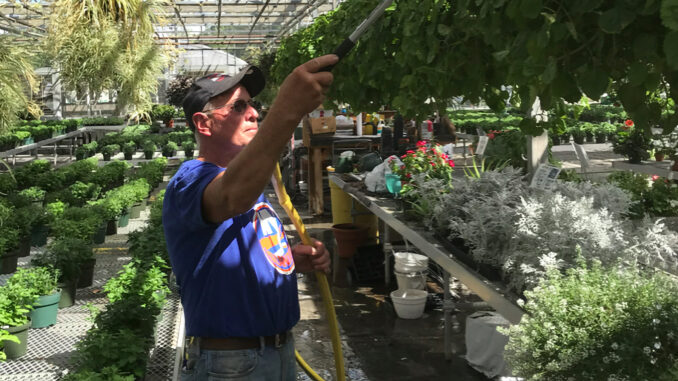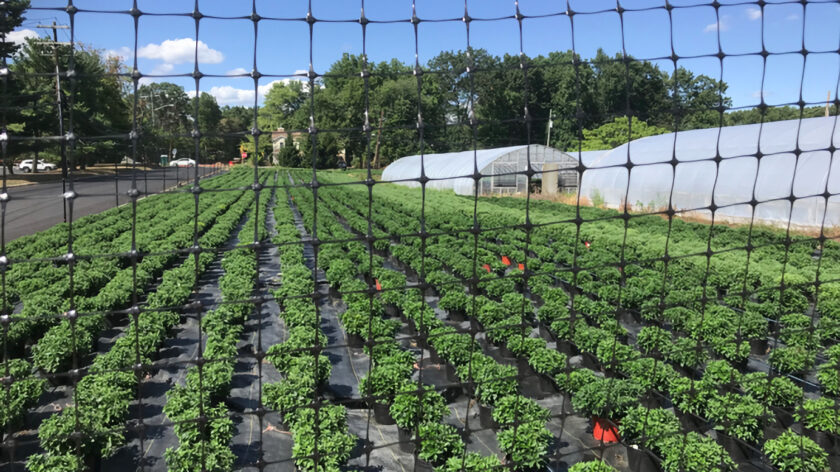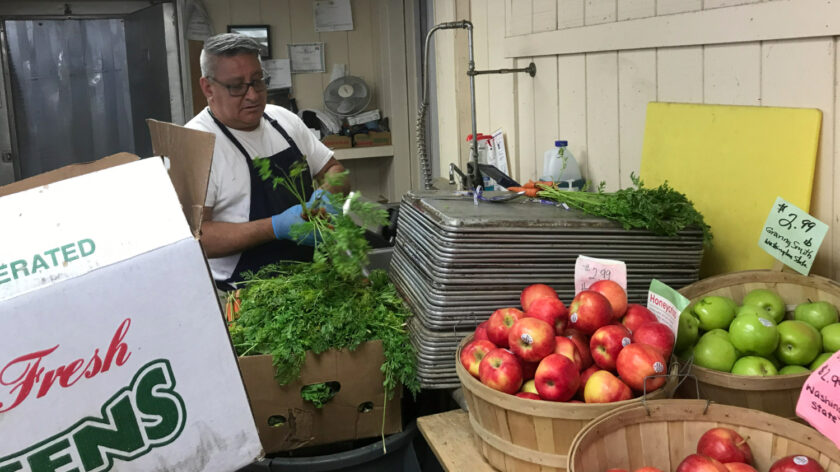
MONTVALE—Less than a quarter mile from the longstanding, Dairy Queen at one of Montvale’s busiest corners lies the borough’s sole remaining working farm and farm stand — DePiero’s Farm Stand and Greenhouses — at 156 Summit Ave., and the farm stand is at 56 Craig Road, just a block off of Summit Avenue.
In 2024 the DePiero farm will celebrate a century of farming in town — if it sustains itself given recent impacts from Covid-19, a difficult economy, and a growing deer population wreaking even more economic havoc on its downsized operations.
In 1951, the first DePiero’s farm stand was opened in Montvale, which followed the founding of DePiero’s farming operations here in 1924.
Over the past several weeks when Pascack Press visited the farm stand on weekday afternoons, a handful of cars and shoppers could be found patronizing the well stocked farmstand and purchasing locally grown produce, along with annuals and perennials.
In mid-August, following a visit to DePiero’s farm stand, Mayor Mike Ghassali posted a video on his Facebook page and urged residents to frequent the stand.
“Did you know we have a working farm in Montvale? DePiero’s Farm and Stand at 156 Summit Ave. One of the last farms in the region. DePiero’s Farm Stand & Greenhouses,” wrote Ghassali, also providing a link to the farm’s website.
“And it’s basic economics: the farm has to generate revenue to stay in business. The prices of the plants and flowers are cheaper than the big stores, the fruits and vegetables are fresh and look delicious,” the mayor observed.
“If we want the farm to stay, we all have to support it. Please make a point to visit the farm and see for yourself,” Ghassali said.
However, the farm and farm stand is in a struggle to survive, buffeted by forces they cannot control, including a falloff in their wholesale business to landscapers, heavy plant losses due to deer browsing, fewer markets and buyers for wholesale plants, and the long-ago loss of a potential regular customer — the local Wegmans —when a deal to provide seasonal plants there fell through during negotiations.
Tice’s, Van Riper’s, sold to developers
Two nearby farms in Woodcliff Lake, Tice’s and Van Riper’s, which were sold off to developers in the 1990s — Van Riper’s sold in 1994 and was turned into an A&P, now Whole Foods; and Tice’s sold in 1997 and was turned into an upscale mall — have disappeared, leaving no traces of their former agricultural history.
Glen DePiero, a Park Ridge resident who has worked on the DePiero farm for six decades, told Pascack Press that the enterprise is struggling to stay afloat as it deals with a declining wholesale market and increasing costs, including on everything from utilities, employees, and the price of staples such as planting pots, shipping, and additional trucking fuel surcharges.
He said the utility bill alone to heat the greenhouses in 2021 was $46, 000.
Pascack Press interviewed DePiero as he watered hundreds of small mum plants and hanging plants in one of the farm’s cavernous greenhouses on a hot, late August afternoon.
He said he would like to increase retail sales to North Jersey customers, which have fallen off over the years, and said he hoped that more residents would frequent the farm stand.
He said annual budget hits caused by declining sales to landscapers, and more frequent plant destruction by deer grazing has really hurt the business. He said deer recently destroyed $20,000 of mums in 2021.
On one recent night, he said, the deer ate or destroyed nearly 1,000 mums. He said he was then forced to install a $5,000 plastic deer fence, 8 feet high, the next day to prevent more destruction.

The state Farm Bureau, which represents and advocates for New Jersey farmers, reports that deer overpopulation is an “emergency” statewide. A sustainable and healthy deer density, according to wildlife biologists, is five to 15 deer per square mile.
A recent infrared deer population survey conducted by environmental services firm Steward Green involved eight sites throughout New Jersey. The survey concluded that New Jersey averages 112 deer per square mile.
“In some counties, the deer population is as high as 270 individuals per square mile,” said the bureau website. The study did not include any Bergen County sites but did include one in Passaic County.
The state Farm Bureau has called for a “public policy solution” to deer overpopulation and cited a Rutgers University study that stated. “More than $2 million in deer-related depredation to select grain crops — and more than $13.6 million in deer-related depredation to nursery stock [statewide.]”
A 2005 article in the Journal of Extension, citing negative deer impacts on 13 northeastern states including New Jersey, reported: “The estimated annual economic loss from deer depredation to nursery stock was $27,878,180, ranging from a low of $13,660 for Vermont to a high of $13,628,950 for New Jersey.”
‘It’s getting worse every year’

DePiero said because deer eat nearly all plants, including lately even begonias, homeowners and commercial customers have been buying fewer plants overall for home and commercial grounds. That has cut deeply into annual sales, he said, and more deer are also reducing his sales because no one wants to purchase plants if the deer will eat them.
“It’s getting worse every year,” he said of the deer impacts. He said he saw a recent online video that showed 21 deer visible at one time on a side street in Park Ridge.
He said the deer overpopulation is a big problem and a drain on revenues. He said due to this year’s drought, landscapers report the deer are eating almost all plants and shrubs. DePiero said so far the only plant they do not seem to be browsing on is vinca.
Partial sell-off gave rise to The Shoppes at DePiero Farm
About a decade ago, the DePiero family sold off 27 acres of a then 55-acre farm to a developer to create The Shoppes at DePiero Farm, now known more informally as “The Farm,” which includes a Wegmans supermarket and assorted retail shops and businesses.
However, the DePiero farmstead acreage has been slowly disappearing.
A little over a decade ago in June 2012, a headline in The Record’s “Local” section noted, “Montvale hears plans for farm,” and a subhead, “Wegmans would replace DePiero’s.”
While the newspaper reported reviews of the farm property sale were mixed, the article noted DePiero’s was a fixture in Montvale since 1924, when 16-year-old Dante DePiero purchased an initial 13 acres of land that grew over decades to 102 acres covering 31 parcels.
In 1951, Dante’s son, Ed, and wife Elaine opened the first local DePiero’s farm stand, where they successfully sold fruits and vegetables.
The DePiero family owns approximately 12 acres, with 2 acres covered by greenhouses used to grow annuals including mums, and another 10 acres mostly used for growing plants and a few houses.
Farmstand moved when construction started
The DePiero Farm Stand moved from the corner of DePiero Drive (formerly Mercedes Drive) and Grand Avenue to its Summit Avenue location when construction began at the “Shoppes” complex.
DePiero said though they originally had a sign at the prior Grand Avenue location giving the stand’s new address, local officials had them take the sign down.
DePiero said that his younger brother and sister work in the farm stand, but noted all the siblings and relatives are getting older.
“A lot of people don’t know that we moved here even though it’s only one block from where we used to be,” said DePiero.
He said if the stand could draw more customers from North Jersey, it might help sustain the farm and its long-running Farm Stand. However, he could not predict the future, he said. He said five DePiero families have a stake in the remaining farm operations.
A Pascack Press reporter admitted to DePiero that he frequently drove by the location off of Summit Avenue without realizing the farm stand was only a few feet away on Craig Road. (The reporter purchased approximately $27 worth of produce, including tomatoes, eggplant, a blueberry pie and some preserves from the Farm Stand. Everything was delicious, our reporter said.)
A lockdown lifeline goes away
DePiero said he hoped more local residents would frequent the farm stand, and purchase produce or plants. However, he noted that during the Covid-19 pandemic, DePiero’s offered a curbside pick-up of fruits and vegetables that was successful. Unfortunately, he said, sales slumped following the pandemic when the curbside pickup ended.
He said DePiero’s runs a monthlong haunted Halloween hayride that provides some leasing income and pay for tractor driving.
“They do very well, we don’t do very well because I just get paid for driving the tractor,” along with minor land leasing income, he said.
He said the spooky hayride generally starts the last week in September and runs through Halloween. Details can be found on the farmstand website.
He said they’ve been doing that for about a decade, although it has not boosted farmstand sales enough.
Another potential customer base, a proposed 157-unit senior complex at 127 Summit Ave., was withdrawn by its developer a couple years ago and the borough recently offered $4.5 million to purchase the 28-acre property for possible preservation and future market-rate, age-restricted and affordable housing.
In August, acres of mums could be seen on the farm. DePiero said the farm has used a drip irrigation system for many years to assure plant growth.
In addition to mums, he said poinsettias, hydrangeas, and lilies are grown in the greenhouses, and in the spring annuals of all varieties are grown.
Asked if they might add more farm entertainment and events to draw customers, DePiero said he has put in 14-hour work days at the farm for decades.
“I cannot work any more hours,” he said.
